The discussion in early June, 2014 featured Jane Goodall, and actor and First Nation activist Rosalie Kunoth-Monks. I write about the memorable experience of seeing the ground-breaking film Jedda in which Rosalie starred.
I was taken to it by my nanny from the Kamilorai Tribe. I write about my visit to Rosalie’s homeland ‘Utopia’ in the mid sixties.
in my portal, Who we are and where we come from.
As a child, Rosalie’s film character, Jedda, dreamed of learning the customs of her tribe. Her white foster mother countered: ‘Oh, Jedda! Whatever would you do out in the bush with all those naked monkeys?’
Rosalie’s purpose now is for her people to retain their language and their land. To hold onto their corroboree and their rituals.
Jane too knows what it is like to have powerful dreams. As a child, she dreamt of going to Africa and living with animals and writing about them. She says, ‘Everybody laughed at me. That it wasn’t possible for a girl. ’Well as we all know with the help of Louis Leakey she did just that. She lived with tribes of naked chimps, learning their customs and working to retain their lives and land. Jane saw how rapidly forest was disappearing across Africa. In all the countries where chimpanzees lived, people were destroying the forest for one reason or another — in many cases people were just trying to survive. Jane realized right then and there that she would have to leave her beloved Gombe forest and work to save the chimpanzees.
Not ones to be easily put off, both Rosalie and Jane learned what it’s like living close to nature and the importance of protecting it.
Well past what you’d expect to be well past the bedtime of most elders, these two grande dames were panellists on the ABC television Q&A program discussing our understanding of primate behaviour and interaction. A gracefully aged replica of the popsy who first set foot at Gombe five decades ago, Jane’s hair, tied back as usual, has turned silvery grey. Now in her eighties she exudes a calm confidence.
I bring in my ideas as well as those of another to extend the discussion.
Rosalie
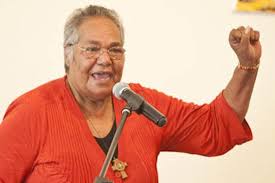
who resides in the Utopia homelands, 260 kilometres north-east of Alice Springs is a passionate activist in defence of her people’s homelands. She knows only too well how the Federal government had gone about ‘advancing’ the Aboriginal cause there in the Northern Territory intervention. In this simple solution indigenous people were driven off their traditional lands and onto reservations like American Indians. Let’s just look at the background to the intervention.
The pretext for the intervention were false claims made by the media and government about paedophile rings, petrol warlords and sex slaves in Aboriginal settlements. These claims, discredited by the Australian Crime Commission and the Northern Territory police, were made by the same team that claimed refugees on boats heading to Australia threw their children overboard.
In 1979 the Alyawarr and Anmatyerr peoples gained permanent freehold title to the Utopia leasehold. After the land claim was completed, the country, Arapunya, has not been grazed significantly so it has largely returned to its natural state.
Aboriginal families then moved back to their more traditional lands
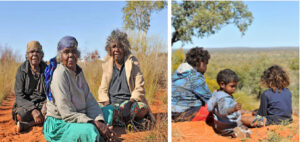
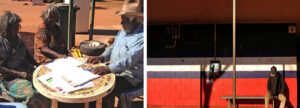
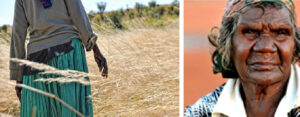
where the children
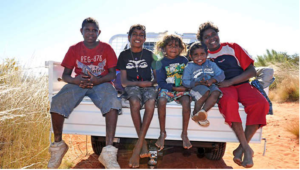
could explore the terrain like the ilpay [creekbed] at Soapy Bore.
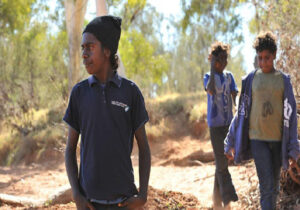
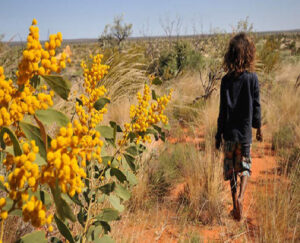
The outstations of the pastoral lease form the basis of the sixteen geographically separate and distinct homeland centres of today.
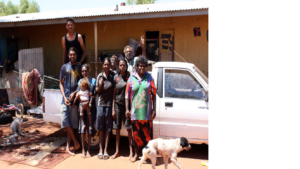
Members of the National Party, members of the conservative coalition, want to extinguish native title on pastoral leases. Senior ministers and bureaucrats in the Howard government openly questioned the viability of Utopia and its scattered outstations, arguing it was no longer financially viable to maintain them, that the infrastructure costs were prohibitive for taxpayers. It is costly to maintain bores, power generators and schools – some teachers travel up to 100 kilometres a day to reach the five schools. School weeks have been cut to four days, which can amount to several years of lost education for a child. Ministers in the Howard Government argued for the settlement’s closure and the removal of inhabitants to enlarged townships. There, they suggest, better services could be provided.
Fellow conservatives see reluctance to move as attempts to preserve a ‘cultural museum.’ Former P.M. Tony Abbott sees their desire to stay put on their traditional land as a lifestyle choice which the government could not ‘endlessly subsidise’. Backbencher Denis Jensen believes this lifestyle to be one of the “noble savage” Reiterating the legal fiction of “terra nullius”, a belief overturned in the 1992 Mabo High Court decision, Abbott stated in 2014 that Australia was ‘unsettled’, “nothing but bush” before British invasion.’
Communities like Utopia are on mineral-rich lands that cause mouths to water in corporate and government boardrooms. Mining companies have made sinfully huge financial gains from the Northern Territory’s substantial oil and gas reserves.
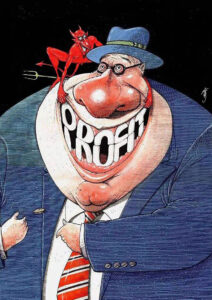
The ongoing implementation of the Northern Territory Intervention ensures communities such as Utopia will never see the benefits of this boom. It’s all about power and greed.
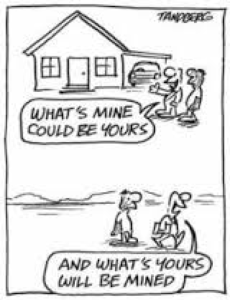
Rosalie advocates indigenous people’s rights to remain on their homelands. She flatly rejects arguments that the intervention was in any way helpful. Troops were not sent in with supplies to build kitchens, bathrooms and toilets. When they were sent in, townships were compulsorily acquired and native title legislation ignored.
Yet no prosecution for child abuse resulted, and studies concluded that there was no evidence of any systematic child abuse. Rosalie says the move displaced more indigenous people from their traditional lands, depriving them of opportunities to speak their native language and severing links with their culture.
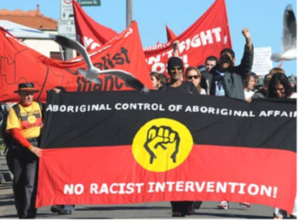
‘It wasn’t that they were coming there with bulldozers or getting the army to move us. It’s that they’re trying to starve us out of our home. They won’t support us becoming sustainable in our own right. If you’re made to feel a second-class humanity, if it’s not ethnic cleansing, please let me know what is.’
‘Investing in the homelands would be a better option than resourcing the larger regional centres. Utopia, which is world-famous for its dot paintings, is trying to start its own cattle business and wants to be a cultural centre.’
It’s Rock art, includes aherr impaty (tracks of the kangaroo), near Camel Camp.
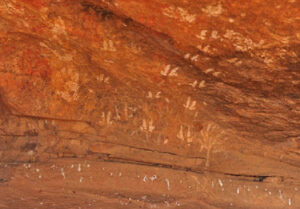
The ancient Aboriginal way of life rejects much of comfortably off Australia’s eating, working and leisure habits. When considering it’s worth, one discovers a great paradox. On all the usual measures – unemployment, low income, overcrowding, lack of education, Utopia fares somewhat worse than the NT indigenous average.
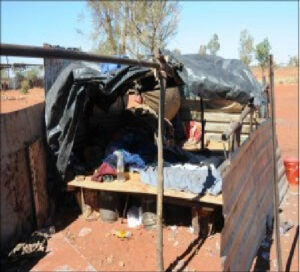
And yet their health is better than average. Obviously, it is not due to the usual social determinants of health. Despite their impoverished appearance the Utopia communities are actually a comparative success story. Thanks to the financial and moral successes of the decade long art movement, cardiovascular disease and smoking are on the decline in Utopia; obesity is virtually non-existent, and life expectancy is significantly longer than in neighboring Northern Territory aboriginal communities. Its citizens have lower rates of injury and infection and spend less time spent in hospital. Alcohol, substance abuse and sex abuse are rare and school attendances are high, with more than 80 per cent of enrolled children turning up.
The doctor at the Urapuntja medical clinic, believes relocating people from outstations to urban centres such as the town camps of Alice Springs or Tennant Creek would be a big mistake. Outstation life he says, even among the physical squalor, is healthier because alcohol is banned and petrol sniffing is non-existent. Close ties to traditional culture has strongly mitigated dysfunctional behaviour.
These health benefits have been taken to be largely the result of the more active outstation lifestyle with its higher level of reliance on bush foods, plus living away from the ready availability of alcohol.
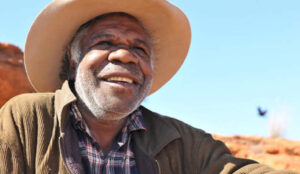
The cultural aspects of people living in harmony with the land and their own holistic concept of health are the important contributing factors. With outstation living comes a much healthier diet. When people cannot access the local store frequently their health improves. They hunt and gather natural foods such as kangaroo. Out here you can measures a person’s life expectancy from the distance they live from the store.
The community-controlled Aboriginal Medical Service, its provision of outreach rather than just centre-based care and chronic disease management and prevention programs such as well-person’s health checks are important contributors to their better health.

If it ain’t broke, don’t fix it.
Rosalie declares the intervention was a ”huge violation of human rights”, moving people away from the outstations and into centres where you have to ‘fight your way through the suffocation of racism’.
Away from family and culture indigenous people often struggle hard: ‘Our beings are very fragile,’ she says. ‘We disagree with being herded by the army into the big centres.’
An Amnesty report argues the policy of selecting growth communities – which has seen priority investment in housing and health – is disadvantaging residents of the traditional lands where one-third of the indigenous population lives.
Through inadequate funding of new and refurbished housing the government is taking away the possibility of people to live on their traditional land.
Rosalie urges her people to make the necessary adaptations to become ‘citizens of the globe.’
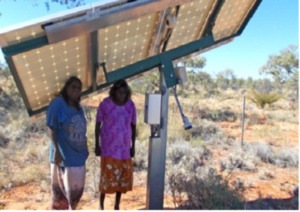
‘Aboriginal identity, underpinned by land and culture, has to allow for individual response to change’, she says.
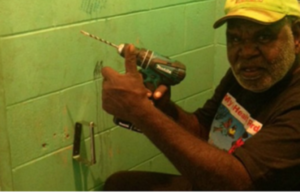
‘Culture cannot be taken away; it is given away or reinforced with every decision an individual makes. Many think romantically we can respond to new situations out of old eyes,’ she says, ‘but we need new knowledge’.
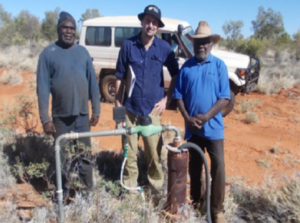
We are on a path to cultural suicide if we continue to smash up against today’s world. Being a victim cannot be part of the identity we seek. Aboriginal identity has to take us beyond land and culture.’
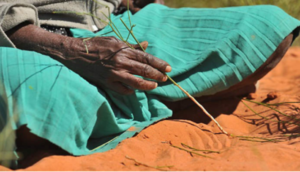
Onto the discussion in Sydney. One member of the audience got the ball rolling, asking Jane: ‘Jane Goodall, since you have famously spent many years studying chimpanzees in Tanzania, and remain the only ‘human’ recorded to have been accepted into their society, it would be fair to say that you have a greater understanding of chimpanzee behaviour and interaction than any other ‘human’ alive. What have you learned from their behaviour and how does that reflect upon the way we behave with each other and other species? Given that your reports document both peaceful and malicious interactions between these animals, how closely do your observations of their society reflect those of ‘human’ society and, can we learn from these creatures about the ways in which we interact with each other and members of other species?’
‘Basically what we know from the chimpanzees is how arrogant we’ve been to assume we’re the only beings on this planet with personalities, minds and feelings.
The chimpanzees teach us very clearly that we’re part of and not separated from the animal kingdom.
We are actually, biologically the fifth great ape. We differ from chimpanzees by just over 1 percent in the composition of our DNA, and then there’s all the similarities with the immune system, the blood, the anatomy of the brain but also the way they communicate, kissing, embracing,
holding hands, patting on the back, holding out the hand, begging for food, swaggering, shaking the fist. close bonds between mothers and their developing offspring that can last through a lifestyle of up to seventy years,
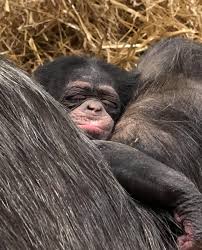
and males vying for dominance. It’s very political.’
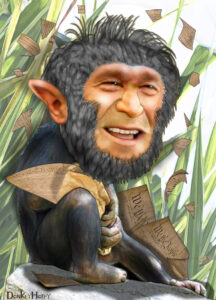
‘Tony Jones the presenter of the forum said, ‘Yes, and the darker side is that warfare exists in chimpanzee society, something you recorded and other scientists said, ‘Oh don’t say that. That will make it appear violence is innate.’
Jane: ‘I do believe violence has come with us along our long evolutionary pathway. Look around the world. Aren’t we a violent species when provocated. But do we not have the intellect to control our violent behaviour? I think so.’
Tony said, ‘What did you record early about chimp warfare? I’m sure this is what fascinates people along with the nicer side. There is this male dominance that happens when alpha males fall into disrepute or become weaker?’
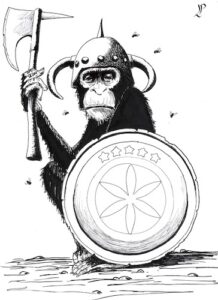
‘The main thing is the males have close bonds. They patrol the boundaries of the territory. They are very territorial. If they see individuals from the neighbouring community, they will give chase, attack and the victim is likely to die of wounds in savage attacks. Over a four-year period, the males of one community annihilated all the individuals who had moved to the south to form their own community. It was the four-year community war.’
Social worker Professor Stuart Rees said, ‘We have a similar situation here. It’s called Border Protection in terms of patrolling the boundaries.’
Just as Australian military personnel were dispatched to patrol the boundaries of First Nation’s settlements, so too were they dispatched to help “stop the boats” under the Abbott government’s asylum-seeker crackdown.
There would be a push by the Australian War Memorial director to have them honoured in the National Memorial in Canberra.
This former Liberal Party leader and defence minister in the Howard government said the sacrifice of patrol boat sailors should be recognised in the expanded shrine, along with those who contributed in recent military engagements and peacekeeping
It comes as no surprise to learn that the Director is working on a proposal for a $500 million expansion of the AWM. He said personnel who protected the nation’s borders should have their story told along with the Diggers who fought in armed conflicts operations.
In the interests of fairness, shouldn’t the stories of those involved on the other side in cases of protecting both external and internal borders be told as well.
After all in both these interventions, these are supposed to be policing, not military. operations. The role of the military is something else. It’s to prepare personnel to fight in armed conflicts operations, not to control the movement of people such as that of First Nations nor that of people fleeing countries we are not at hostilities with.
Which is none.
In explaining what’s behind this blurring of the roles of both services, Stuart said, directing his gaze to Jane, ’What I learned from your work is we shouldn’t be ethnocentric. We shouldn’t be ‘human being centric’ in the way we look at this precious environment. I also learned you were criticised for not having the correct research methodology. The completely blind conventional way of looking at research. Thank goodness you debunked and demystified that.’
‘When I got to Cambridge I was told I shouldn’t have given the chimps names. They should have been given numbers. I couldn’t talk about them having personalities or minds or feelings. Fortunately, as a child I had a wonderful teacher who taught me that was absolute rubbish. That was my dog.’
Tony said, ‘Rosalie, can I bring you in. You’ve learned a great deal watching the animals around you in Utopia and other parts of the Northern Territory.’
‘I hope you don’t mean the humans around Utopia,’ she joked. ‘Sometimes we do believe we are treated like sub-humans because we are the First Nations people. And there is serious dialogue to be had there. Just listening to Jane about the chimpanzees, I think Australia needs to grow up and look outside of themselves. We are egotistical, we are self-serving and we consume everything in our way. Just looking at the animals that Jane has brought to us, we also have to learn from each living species before we destroy every living species around and we’re the last one’s standing.’
‘Are you suggesting humans are not as evolved as they think they are?’
‘I think they think they are. We are destroying really quickly. We have had some very unique animals in Australia. Let’s stop, take a pause and look outside of ourselves and our needs. That’s how I feel.’
Tony said to Peter Coleman, conservative writer and former Liberal parliamentarian,
‘Listening to this, do you feel that perhaps human beings are not as highly evolved as we think we are.’
‘No I don’t. I take in what Jane has said about chimpanzees, but, really, the things that matter-art, literature, philosophy, science, I don’t know that the chimpanzees really have anything to teach us comparable with Shakespeare,
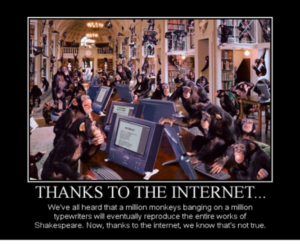
Plato, so on. It’s a fascinating subject for study and we can learn things but I don’t really think that they are in the same quarter, the same region as we are, the same in the things we value in civilisation. That’s what I think.’
Harry McDuff tweeted: ‘At what point did greed overtake intellect to create violence?’
‘Lay on, Macduff, thought. And damn’d be him that first cries, ‘Hold, enough!’
Andre Semer tweeted: ‘It’s the flinging of the dung that really clinches our kinship with the chimps.’
Jane went on, ‘The point is that the biggest difference between us and the chimpanzees is the explosive development of the human intellect. Chimpanzees are way more intelligent than we ever thought. They can use touch pads
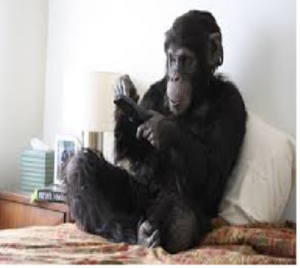
and computers. They can learn five hundred signs of American sign language. But that doesn’t compete with a creature that sent a rocket up to Mars with a little robot that crawls around taking photographs. It doesn’t compare with Shakespeare. So the question is- if this if this is most intellectual creature that ever walked the planet, why on earth are we destroying our only home?’
Tony said, ‘It does sound like politics, doesn’t it, Peter.’
‘I was thinking all the time while Jane was talking, they may not have much in common with our artists, our writers, but they seem to have something in common with our politicians. Though the method of disposing of the old is a little harsher than we are used to.’
Syd Smith from the studio added, ‘You probably realise Jane, we have a government that’s got a pretty low level of interest in the environment and in climate change. It has abolished agencies that assess this change and the Ministry of Science. We are wanting to put ports on the Barrier Reef. Is this your example, perhaps, Jane, of the discontinuity between the head and the heart in our civilisation and if so, what can we do about it?’
‘Well, I completely agree, It is a discontinuity. The clever head and the human heart, love and compassion. To achieve our full human potential, I think head and heart must work in harmony. But what the answer is one of the reasons I am three hundred days a year on the road, developing our youth program, the Jane Goodall Roots and Shoots program. It is in 136 countries. There are about 150,000 active members. A group can be a whole school, pre-school, all the way through university, more adults forming groups. Its message is every single one of us can make a difference, every single day. We have a choice as to what difference we make. The groups choose projects to make the world better for people, animals and the environment with a theme of “Let’s break down the barriers between cultures, between religions, between nations, between us and the natural world.” That’s my hope for the future. These young people, many of them now fully adult and out in the big, wide world, they are the next politicians. How can people be climate deniers? How it’s possible to destroy the forests that absorb the CO2 from the atmosphere, I don’t know.’
‘Ronald Reagan’s infamous remark came to my mind: ‘A tree’s a tree. How many more do you need to look at?
William Blake’s profound remark came as well.: ‘The tree which moves some to tears of joy is in the eyes of others only a green thing that stands in the way. Some see nature all ridicule and deformity… and some scarce see nature at all. But to the eyes of the man of imagination, nature is imagination itself.’
Tony said, ‘Peter Coleman, there were lots of politics couched in that [Syd Smith] question. There were comments in relation to the current government. How do you respond?’
‘I totally disagree with the questioner. I support most of the decisions made by the current [Abbott] government. I think the climate problem is not whether the climate is changing or not. Of course, it’s changing all the time. The question is should we take a catastrophic, alarmist view of it, and I don’t think we should.
I certainly am in favour of coal. It’s the cheapest form of energy. when you think of the poverty and disease in so many parts of the world which can only be fixed by economic growth. This growth can only be effectively done by cheap energy and that is from coal. What about the future of all the children in the poverty-stricken diseased parts of the world? You can’t solve the problems of poverty with windmills so the questioner and I are in different corners. I don’t take the question as seriously as he obviously intends it to be.’
Tony Abbott argues as follows: ‘wind farms are ugly, noisy and much worse. Coal is good for humanity, coal is good for prosperity, coal is an essential part of our economic future, here in Australia, and right around the world. It’s a much used well established commodity in many corners of the globe. People use it to heat their homes and make them comfortable. It burns longer than wood and puts out more heat.’
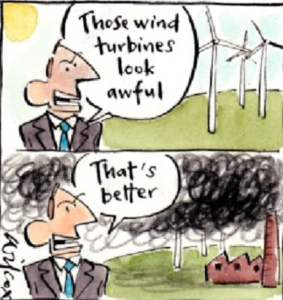
‘And so clean,’ ’some might comment sarcastically, l thought..
I remembered the thoughts of Robin Williams: Clean coal is a bit like wearing a porous condom – at least the intention is there.’
Tony said, ‘Jane, your question to politicians is: ‘Do you really care about the future of your grandchildren? Do you want to have a crack at persuading Peter?
Jane replied, ‘We work in alleviating poverty in six African countries. The point is, yes maybe coal can give us cheap energy, but at the cost of destroying the environment. The species are becoming extinct.
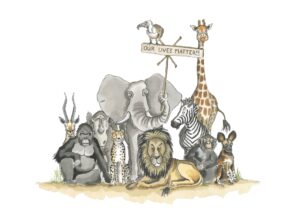
We are unravelling the web of life. How much longer can we have unlimited economic growth in a planet of limited, finite resources, the natural resources we are using as if they’ll last forever. There are other ways of creating energy that are less destructive than coal, but they’re not subsidised by governments. Like wind and currents in the ocean and particularly solar energy.’
One member of the studio audience tweeted: ‘We live in a global society where profit is the moral arbiter. Conservation does not fit that image.’
Stuart Rees commented, ‘This is the most precious commodity we’ve got-the fragile environment. The first astronauts described it as a fragile life support system which we have an enormous responsibility to protect. The overwhelming facts are that the vast majority, 95 percent plus of the world’s respectable scientists say we have an urgent problem.’
Peter Coleman said, ‘No they don’t. Your figures are wrong.’
Another member of the audience tweeted: ‘The cheapest source of energy doesn’t mean the most sensible or sustainable. Coal isn’t cheap when you factor in its destructive effects on human health.’
Stuart Rees said, “The major issue, unfortunately, Peter, was contained in your answer. It’s that we are fascinated with using violence towards the environment. The person the P.M. has put in charge of the commission inquiring into sustainable energy is a climate change denier. It’s like putting the fox in charge of the hen house.
Tony said, ‘Stuart, are you suggesting that development should stop in the world? Just to pick up Peter’s point, the Left has been obsessed for many years in countries like China with bringing up the Chinese peasantry and allowing them to achieve development. Without power that can’t happen.’
‘This depends on how you define the Left,’ I thought ‘and what you mean by development. In spite of maoist excesses and mistakes, the Chinese peasantry were developing in ways beneficial to themselves and less environmentally damaging before their coolie hats were thrown into the capitalist ring. Using small scale decentralised technology and labour intensive methods, millions of rural peasants gained access to science and technology for the first time.’
Stuart said, ‘There’s plenty of development happening now. During a winter in Germany, when there was hardly any sunshine, 27 percent of Germany’s energy was generated by solar power. So, the opportunities are there. The opportunities to generate solar gas are regarded as the next step which is not far away. This notion that we just dig up coal and burn it until we destroy ourselves and the planet is absurd.’
The problem of rising sea levels came to mind.
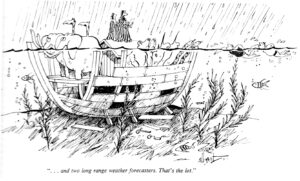
So is there any scientific basis for arguing the build-up of atmospheric carbon dioxide is not causing disastrous climate change?
To consider its role I introduced Piers Corbyn, long-range climate and long-range weather forecaster into the debate.
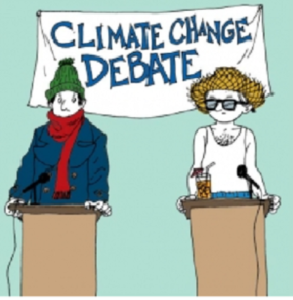
Piers was a schoolboy meteorologist.
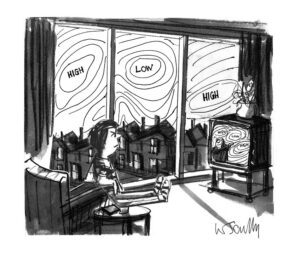
He began recording weather and climate patterns at the age of five, constructing his own observation equipment. Piers believes that traditional meteorology is flawed because it restricts itself to analysing what happens within the earth’s atmosphere. His technique, by contrast, takes in external factors. He creates long-range weather forecasts by analysing how the solar wind – a rush of particles from the sun – affects the Gulf Stream
A man for all seasons, his skill in focusing on solutions spans both social and physical science.
As an activist, Piers led a highly successful campaign on the platform, ‘Housing For All’.
Piers supported his brother Jeremy in the contest for the British prime ministership on the basis that Jeremy stands for proper debate and accountability, including on climate.
Whether in his stand on the state of the nation or the state of the planet, Piers has attracted vehement criticism for his independence of thought. He confounds those craving consensus for whom he doesn’t fit into any neat pigeonhole.
A socialist, from the feet up, his defence of coal, I feel, arises in part from its place in the British psyche. A much-valued source of energy and a source of pride to the miners who suffered so much to extract it.
A pride destroyed by corporate raiders not from love of the planet but from love of profit.
Adding insult to injury of the miners Margaret Thatcher came up with her most devious plan. To deindustrialise Britain and defeat the miners once and for all she popularised and endorsed the science of man-made climate change as a way of converting Britain from coal to nuclear power
Piers has no qualms about defending the motherlode. He justifies this on scientific grounds. Piers declares, ‘The CO2 from coal burning is no danger. Coal conversion to diesel technology which can be made very clean in terms of smoke and particle emissions should be adopted as a low cost, safe and secure future for our energy needs and provide a massive boost to the economy.
I asked him, ‘Piers, are humans dangerously fiddling with the planet’s thermostat?’
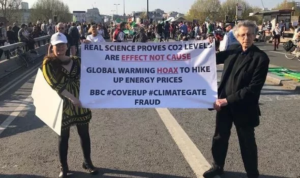
‘Global warming has been exaggerated. CO2 has never driven, does not drive and never will drive weather or climate. Global warming is over and it never was anything to do with CO2. CO2 is still rising but the world is now cooling and will continue to do so.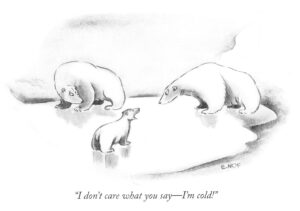
Climate sensitivity, if any, is small to modest. Renewables such as solar, windpower or even biomass do not result in the reduction of any significant quantities of CO2 and are therefore pointless, merely pushing up the price of energy and forcing increasing numbers into fuel poverty.
Science, not argument about conspiracy, must be central to the debate about climate change. Physics is the basis of my service, Weather Action’s world-leading solar weather technique of long-range forecasting. The Solar Weather Technique relies on predictable effects of solar particles, not on CO2 or meteorology models .
‘So you believe that changes in the Earth’s climate and its weather are dictated primarily by cyclical activity on the surface of the sun.’
The main periodical solar activity effect – the largest observed periodicity present in world temperature data – is the 22 year cycle (driven by sun-earth magnetic connectivity). Proxy measurements covering thousands of years referred to for example by Neff and colleagues in Nature 2001, show that, in timescales of 22 years, the magnetic sun-spot cycle and world temperatures move together, whereas CO2, while following temperature in slow general terms, also moves the other way for quite long periods. For about half the time, the 11 year cycle of solar activity of particles, sunspots and radiation will move with temperature and half the time move against it.’
‘Is this is well known to solar and climate scientists.’
‘Certainly. All the pseudo-scientists have done is essentially choose time spans where the two move in opposite directions and ignore demonstrated correlations on longer time spans. Those who do this are either unbelievably ignorant of their own subject or deliberately deceptive.
This contradicts the theory that CO2 drives temperature and climate.’
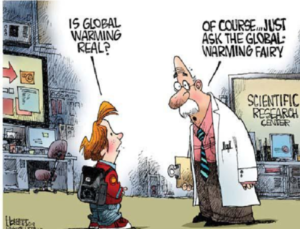
‘Isn’t this what’s claimed as the “settled opinion” of climate scientists and governments around the world?
‘Science doesn’t do ‘settled opinions. Don’t forget it was those with settled opinions who condemnēd Galileo for his support of heliocentrism.’What do you think?
‘I think it’s about plausibility. About what is reasonable and probable. For example if levels of carbon dioxide can be shown to be rising dramatically, is this the first time?
‘I think it’s about plausibility. About what is reasonable and probable. For example, how variable are climatic factors? If levels of carbon dioxide can be shown to be rising dramatically, is this the first time?
”Current CO2 levels, or rate of CO2 rise, are not unprecedented. CO2 levels have been three times current levels. Bob Carter from your very own Marine Geophysical Lab in Queensland bears this out. CO2 rapid rise “spikes” doubtless happened before, given the power of nature compared with man’s puny activity- not even 1% of total greenhouse effect- but ice-core data smoothes them out.
‘The global warmists claim that current extra CO2 causes warming which gets dangerously magnified through the greenhouse effect of extra water vapour in the atmosphere, consequent to the temperature rise. What do you say to this?
‘This also fails. The sea absorbs extra CO2. Furthermore, increased transpiration-cooling by enhanced growth of plants, which is caused by extra CO2, cancels out the extra greenhouse warming of that same CO2. Increased greenhouse heating due to doubling CO2 is 3.7 watts per sq metre. This is negated by about the same amount of enhanced transpiration-cooling of plants, all of which grow faster in extra CO2. Therefore, there is no CO2 driven net heat flow and surface temperature rise. Temperature and climate change in our epoch is therefore driven by other factors, especially solar particle and magnetic effects.
The main periodical solar activity effect – the largest observed periodicity present in world temperature data – is the 22 year cycle (driven by sun-earth magnetic connectivity). Hence for about half the time, the 11 year cycle of solar activity of particles, sunspots and radiation will move with temperature and half the time move against it. This is well known to solar and climate scientists. All the pseudo-scientists have done is essentially choose time spans where the two move in opposite directions and ignore demonstrated correlations on longer time spans. Those who do this are either unbelievably ignorant of their own subject or deliberately deceptive.
‘So can action against climate change make a difference?’
‘Even if temperature trends can be changed – and controlling the sun is a tall order even for a Bush/Blair legacy – there is no evidence of connected change in weather extremes or useful outcomes. Let’s save the planet from real chemical pollutants, but CO2 is not one of them.’
That brought to my mind the following witticism: ‘Oxygen is proven to be a toxic gas. Anyone who inhales oxygen will normally die within eighty years.’
‘Wouldn’t it be better to work to predict climate than make vain attempts to change it?’ continued Piers.
‘So how would you summarise the relationship between world temperatures and carbon dioxide levels?’
“World temperatures control CO2 levels. These levels are an effect, not a cause of changes in climate.”
‘If there is no CO2 it’s just a bit player control knob, if, what does this mean for public policy?’
“If you want to do anything about climate change, have more defences against extreme events. CO2 is driving nothing. It is good for plants. The more CO2 the better. Given that no-one can say what the climate in 2030 will be, erecting a vast global bureaucracy with an inflexible monolithic commitment to reverse what may never happen potentially diminishes our ability to react to what may actually occur.’
“MPs might believe they are saving the planet but actually they are propagating policies which benefit ‘green’ consultants, are ruining the world economy, and – through biofuels policies – are causing starvation and death.
‘The modern Green Lobby is not the brown rice and sandals tepee people they would have us believe. It is a massive world business more powerful than the tobacco, sugar, oil and nuclear lobbies combined and it is based on false science. Al Gore’s commercial stake in green business
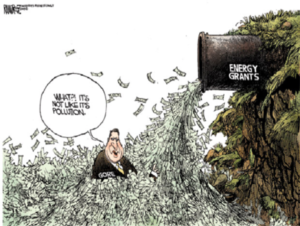
and David Miliband’s closeness to the nuclear industry merit attention. The modern Green lobby is backed by the nuclear industry, the banks which make trillions from carbon credit training and the oil industry.
The oil industry wants to make money from carbon capture. That’s the process whereby CO2 is removed from the atmosphere and for example injected into the sea bed through old oil wells or put into desert sand etc.
‘It goes without saying these very expensive operations.’
‘And because of this pressing environmental problems have been neglected as more and more resources have been diverted to the campaign to cut carbon emissions. Issues related to climate change – such as habitat loss, water shortages, and over-population − need far more attention.’
‘So concentrating on limiting carbon emissions, to the exclusion of many other inter-related issues, is a mistake. And you say the oil lobby is one of the campaign’s principal backers.
Big Oil backs the CO2-Climate Change Scam all the way because it ensures high energy prices

and massive value for much of their otherwise worthless assets in less accessible oil and gas fields. ‘The deliberate decimation of the coal industry has exacerbated the massive rises in oil prices. Coal can be cleanly turned into diesel but that is against the new ‘green religion’.
‘What do you see as the role of the established political parties?’
‘The scam is backed by political parties who need ‘taxation to save the planet’ as an excuse to not have to implement their unworkable instinctive policies to cut taxes and the welfare state.
It is clear that whatever may have seemed the case 10 years ago, that now, with increased data and understanding there is no evidence for the CO2 centred theory of Global Warming and consequent climate change, only evidence against.
‘It is scientifically inconceivable that after changing forests into cities, turning millions of acres into irrigated farmland, putting massive quantities of soot and dust into the air, and putting extra greenhouse gases into the air, that the natural course of climate has not changed in some way. Would you agree something has to be done?’ I asked.
‘Recycling, tackling chemical and smoke pollution, re-forestation are good ideas.’
You see the preservation of rainforests as a top priority, I take it.’
Absolutely. They are essential for maintaining biodiversity. Just bear in mind that mature, ageing forests are triggered to release CO2. However, this trace gas is not a pollutant and the holding back of world development in the name of false science is a bad idea. The grim reality is that after two decades of campaigning, honest progressive people who wanted to do good are now imprisoned by larger interests and the world is suffering and may face an uncertain nuclear future.
‘What about the role of biofuels?’
‘Biofuels – the burning of food as fuel and the distortion of agriculture to grow fuel crops rather than food crops – are the main cause of the rise in world food prices and consequent starvation and death.
‘It’s time for a reality check to bring in only genuine green policies and save the world economy. The UN IPCC must be called to account and integrity in science and politics must be brought back. Let’s have proper, rational discussion instead of the politician’s bubble, which is often based on recycled opinion.”’
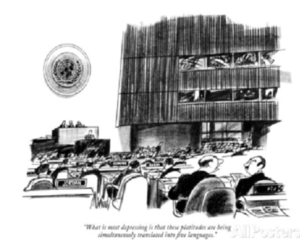
‘So what do you see as the greatest threat to the atmosphere?’
‘Investment of billions by countries such as my own on nuclear weaponry is both a waste of money and, if they were ever used, a crime against humanity. In fact, if nuclear weapons were used in any war, just of a few of them, the climate change we would be worrying about would be a nuclear winter. My brother, I’m proud to say, is committed to abolishing our nuclear arsenal.‘
‘There’s hope for us at last when we have a leader who believes we are best protected by pulling in our horns and forswearing nuclear weapons.’
‘The issue of nuclear proliferation and the potential for nuclear war is an issue for environmentalists too.‘
‘It’s been levelled at you, Piers, ’I said ‘that you keep the details of your methodology for making predictions on the hush. You have been berated for making unfounded claims about the power of your predictions. It’s been said that you’re a scientist whose work has not been peer-reviewed.
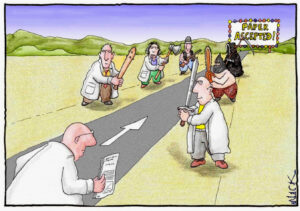
How do you reply to this?’
‘The idea that something isn’t science because it hasn’t been published is complete nonsense.
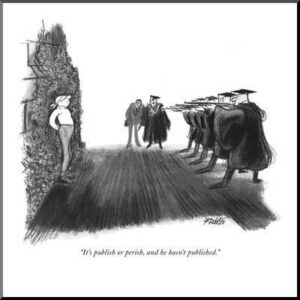
I can assure you that the SWT will be published when matters of intellectual property are sorted out.’
‘Piers, could you talk us through the basic physics of the process by which the sun is the key driver of climate change on Earth?’
‘In general we tend to think in terms of an active Sun being responsible for weather extreme’s and a calm Sun, that is a spotless one with less of an influence to the Earth’s weather system. How is it that we have a spotless Sun and yet find the development of several hurricanes in the Atlantic? How is solar activity driving these developments when there seems to be so little happening on the Sun.’
Piers explained this as follows, ‘There is a lot more to the Sun than light and spots. Most of the important effects are invisible and complex. If we had magnetic eyes so to speak the Sun would look twice as big and very complex. If we could see the solar wind of particles that rushes from the sun all the time Earth would be right in the wind – which in fact goes on to way beyond Pluto. The Earth is in the sun’s extended corona.
‘The changes in magnetic connectivity between the sun and the earth are very important. Even when apparently there is not much happening on the sun there will be events of all sorts which we cannot see and changes in how they link magnetically to Earth are modulated by various factors in the Earth’s stratosphere or magnetosphere or even by lunar effects.
The sun-earth general set up we are now in is odd to even cycle (23 to 24) solar minimum transition. In these periods (which go on for a few years every 22 years or so) the earth is most sensitive to small changes on the sun. Consequently, we can get extreme weather events without much obvious action on the sun.
For example, we at Weather Action predicted a very large North Atlantic storm with exceptional sea swell would occur at end Nov 2007 and indeed the largest sea swell ever recorded was reported on Irish coasts. The subsequent storm track caused for example tornado type events in France and Belgium. Some meteorologists in Holland who seemed to have been praying for Armageddon said our forecast was ‘wrong’ because they didn’t get deluged although they might have been in a possible storm track. Our forecast of the event was not wrong. Holland was just in the wrong (or right!) place.
Another important situation was the very dramatic shift of Siberian high pressure last winter giving super-cold in China for example.
Variations in the Jet stream are driven by sun-earth magnetic and particle activity. For summer 2007 and summer 2008 we correctly forecast very large Jet stream shifts for Ireland, Britain and much of west Europe which gave the tremendous deluges and floods which we specifically forecast six months ahead to within a day.
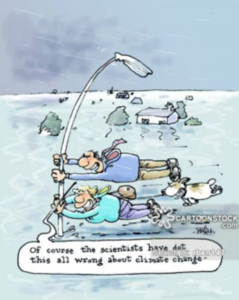
Wild Jet Stream behaviour now dominating world circulation will continue for two more decades as the world goes further into ‘Mini-Ice-Age’ type circulation.
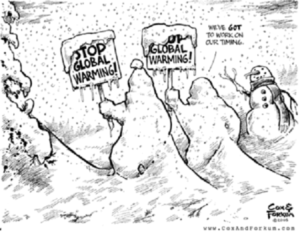
‘So Piers, would you care to explain the difference between standard climate science and your own views’
‘In the [standard] model, where the jet stream is depends on the temperature [of the Earth], whereas we say that the temperature depends upon where the jet stream is.”
The temperature of the Earth’s atmosphere drops at high altitudes, and rises towards the surface, and the reason Venus is very hot is because it has “tons and tons of atmosphere.” In the Earth’s past it had a thicker atmosphere, and it was warmer, and “the atmosphere was so dense that pterodactyls could fly,” and “the atmosphere is [now] about half the density as it was.”
Force is dependent on 1/R rather than 1/R² as in normal gravity, which may explain why the size of galaxies are all about the same.
‘How do you see the structure of the modern establishment of physics.’
‘In my opinion, the rate of progress of physics is being severely curtailed by just the way it’s structured, and indeed all science is structured. I saw something recently, and someone said ‘How come there haven’t been any basic new ideas in physics since Einstein?’ Or Niels Bohr. It’s true. There’s a sort of gap. I think the reason is more and more because the academia is essentially corrupted into whatever goes, and whatever doesn’t go is stopped, And the Royal Society is a professional body of back-scratchers.’
‘Are you a CO2 sceptic or denier?’
‘I’m a denier not of climate change but of global warming. Those science deniers who claim man’s CO2 is driving weather or climate must produce evidence. They cannot do so because there is no such evidence and they cannot even forecast anything. In its 2001 Third Assessment Report. IPCC’s prediction had two components: (1) global warming would cause milder winters and (2) global warming would cause a decline in heavy snowstorm events. These two predictions were clear and unequivocal. Both failed totally.
All the warmists do is wait for extreme events and say that whatever happens is what they expected. Such nonsense should not be allowed to pass, yet shamefully many who style themselves as science correspondents and experts promote this nonsense. Global warming is a deceitful political game.’
Back in the ABC studio, the panellists spoke of their concerns for the future. Rosalie opined on the endless political games stressing economic growth as a goal in itself: ‘We’ve got to make up our minds, do we want a world where everything is going to be left to our grandchildren, or are we going to consume and consume and consume in the name of progress. What exactly is progress? Let’s look at the fragile earth and let’s take care of it. It’s the young people, tomorrow’s people who are saying it.’
Another tweet asked the following question: ‘Why does conservatism not include conserving the planet?’
An unabashed conservative, Peter said, ‘We must take care of the poverty and disease and malnutrition in the world and the way to fight it is cheap energy. We must not cut off our nose to spite our face.’
Then Jane gave her thoughts on climate change: ‘Most people will agree that since the industrial revolution, the heating of the planet has increased in rather an extraordinary way. Nobody will deny that there are cycles, that it has heated and that it’s cooled, it’s heated and it’s cooled. Since the industrial revolution with the emission of huge amounts of CO2, and to some extent methane gas, it’s heating up more than the scientists have predicted. The coal we’re burning is putting more CO2 into the atmosphere. We chop down the forests, burn them particularly for palm oil plantations, and up goes more CO2. There are fewer trees to absorb the CO2, which is what they are. The great carbon sink. The other great carbon sink is the ocean, and as there is more and more CO2 in the atmosphere, the great kelp fields and grass meadows in the ocean cannot use that amount for photosynthesis. So it’s dissolving into the water. This is causing acidification. The ocean is less able to absorb CO2. Our two great CO2 absorbers are increasingly malfunctioning. As for methane, a lot of it comes from the fact that more and more people around the world are eating more meat. These animals, ’said Jane holding up a soft toy cow, ‘are being kept in intensive farms and huge areas of forest are being chopped down in order to grow grain to feed the livestock. They eat grass and methane comes out.’
Tony said, ‘Peter, I notice you have crossed your arms which is usually a sign for a panellist you might disagree with everything that has been said.’
‘Yes I do. But I will leave it at that.’
Tony Abbott, the leader of his party would utter his famous words to express such coyness.: ‘No-one, however smart, however well-educated, however experienced, is the suppository of all wisdom.’
Was someone on the panel going to mention the other cow in the room. The sacred conservative one. The ‘disappearance’ of racism from Australian society’.
Tony asked, ‘Rosalie, what do you think of this notion that there exists some residue of White Australia in this country?’
‘Of course there does. Make no mistake about it. We find it harder. We’re unemployable. We know this not because we have wisdom, or because we have some academic value or learning. I live with real discrimination. I live with hatred of my colour because I’m a First Australian person, and so do my people. That’s not dramatising or even exaggerating. We have a Minister for Aboriginal Affairs. It is exactly the same as Native Affairs. I have lived for over seventy years under a regime and a system that not only destroys my culture but also me as a person. We do live under trauma. Just look back to 2007. One of the most horrific controls was put on us with absolute lies. We were all paedophiles. I’m not saying that white Australians are racist. What I’m saying here is that the policies that come out of the federal government are-enough is enough. We want to take a journey, each human being in Australia and find the truth and find some justice for the First Nation’s people.’
As Rosalie spoke everybody went silent.
Another tweet came in: ‘Australians’ fears of race differences are exploited for political purposes.’
Tony: ‘Are you saying that you feel nothing much has changed?’
‘Nothing at all.’
‘The country has changed a lot since you were a young woman. At that time, you said you doubted yourself as a human being.’
‘Yes, because it keeps being reinforced over and over and over again by the policies. It doesn’t matter if there’s a change of government. The White Australia Policy they got in Federation in 1901, that is alive and well in Australia, and it has usually experimented on blacks in the Northern Territory because we are not a state. Come up and live with me sometime and live my life and I’ll show you.’
‘Peter Coleman. you have a different view.’
‘I’ve listened to Rosalie with interest because of her great experience. What she says is important to listen to. I also listen to aboriginals who totally disagree with Rosalie. Noel Pearson, Bess Price, Marcia Langton and so many more. From day one of British settlement in Australia, there’ve been programs to help in this area. There’ve been church missions, government welfare, the Intervention, apologies, billions of dollars and so on, and the problem has not been solved. It’s not going to be easily solved. My own solution, my policy program in contrast to all the dud policies we’ve turned out, would be assimilation, integration. I mean, the full monty, not just schooling or something, but intermarriage, all forms of integration. Even then the progress is painfully, heart-breakingly slow. But at least there’s progress with assimilation. and to attack the white Australians who are determined to do something is the wrong way to go.’
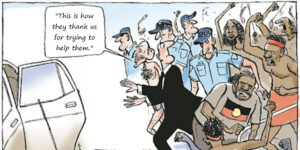
Discussion arose over John Pilger’s documentary Utopia which highlights the denial of justice for aboriginal people.
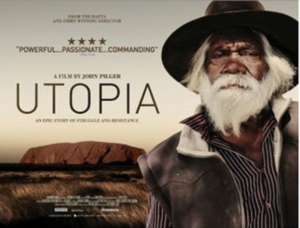
Whether it was helpful in contributing to reconciliation-or conciliation as some prefer- or was just indulging in ‘white guilt’.
Stuart said, ‘That film is a wake-up call to identify what exactly is happening now.’
He added that John Pilger should balance his coverage by presenting some of the successful projects involving aboriginals.
Tony said, ‘The film pinches a nerve because the award-winning author focuses on things that continue to shame Australia.
Peter Coleman said he thought John’s documentary was dreadful. ‘He should be deeply ashamed of it. Of course, he isn’t. He hates Australian society.
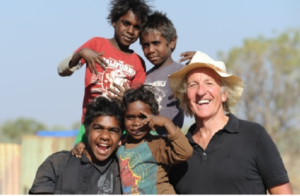
This film demonstrates that.’
What the film actually exposes are damning things that a section of conservative society would prefer not to know about. It exposes the worsening conditions for Aboriginal people as a product of the return to assimilationist policies, it looks at people they’d rather forget. And it looks at others. They’re the folk lined up in his sights. The admirers of mining magnate Lang Hancock who suggests in a 1984 interview chemical sterilisation of “half-caste” indigenous communities through their water supplies would control the indigenous problem within a generation.
Against all the platitudes, amplified for Invasion Day, that pretend the horrors are in the past, and that “the first Australians” are a benign thread in a harmonious Australian national story, Pilger insists on the truth. The here and now is revealed to be inhuman, embarrassing and deserving of obloquy. His films remind us who we really are – and not everyone likes it. To those critics who see it as negative and unbalanced, John replied ‘In fact, Utopia is a celebration of Aboriginal resistance. The indigenous people I interview are heroic, having achieved extraordinary things against the odds and in that respect, Utopia is a very positive film.”
It begins in the rich metropolis of Sydney, in one of the richest countries on the planet. “This is Sydney,” John says in his voice-over while sunlit images of yachts and people fishing appear on the screen. He’s checking out rental properties overlooking Palm Beach, and the fantastic views come with an equally fantastic price tag: $30, 000 a week during the high season. Behind Palm Beach is a battleground, where the local Aborigines fought the British colonists; they lost, and the inference is clear – winners get the beach, losers get a tin shed in the middle of the desert.
After flying to the outback for his exposé, John drives
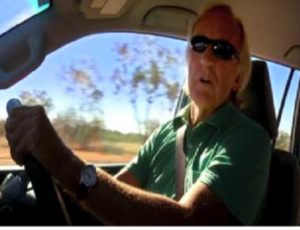
into ‘Utopia’. He finds an impoverished community deprived of the basic services that the majority of Australians take for granted. There are the same mean shacks,
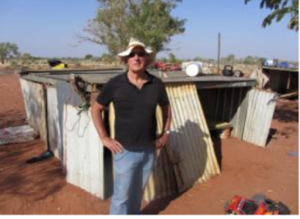
the same lack of basic services and the same easily curable diseases such as trachoma. He discovers the shame of entrenched neglect and continuing failure to provide even the most basic of conditions. He shows us Aboriginal communities forced to live with 15 to 30 people to a house, with no electricity, kitchen, shower or bathroom, and only an external shared tap and fire to cook on and little or no transport. He shows us extended families of sixteen to twenty people living in the one house – identified by government officials as an asbestos hazard. These deplorable conditions are common across remote Aboriginal communities. A lack of sanitation and cleaning facilities directly impacts on the health of children and adults, with cross-contamination leading to diarrhoea, gastroenteritis and otitus media and resulting in hearing loss and delays in learning. There is nowhere else to go, so community members are forced to continue living in homes that seriously damage their health.
The film shows quickly why tourists aren’t encouraged to come to Utopia. It wouldn’t win any awards as ‘Tidiest Town of the Year’. Smashed cans and broken glass glitter in the dust; plastic grocery bags float in the breeze. The concrete houses resemble military barracks long since given over to squatters. Some people have centred their lifestyle in and around a dusty knot of broken-down sedans and station wagons, which they use for shelter.
Those who fail to invest in Aboriginal communities, governments blame aboriginal people for their own poverty. A thousand generations of nomadic heritage is undoubtedly part of the problem. The values to which indigenous Australians facing the modern world. cling are those values that were previously the source of their greatest triumphs over adversity. For 40, 000 years, the accumulation of possessions was considered an impediment to a lifestyle that required constant mobility within a harsh climate. Surplus food was used up, and refusal to share resources with the community -a cautionary motif in many aboriginal dreamtime stories- could result in violent punishment. Life was lived in the mythic moment; most aboriginal languages had no words for “yesterday” or “tomorrow.” To this day, most of the Aborigines living in Utopia, like poor whites elsewhere, spend or share their money as soon as they receive it. White Australians run all the outback supply shops, since indigenous proprietors would be culturally obliged to give away their goods for free. For the same reason, aboriginal auto mechanics are virtually non-existent — hence the abundance of dead cars.
In many ways, the social complexities of aboriginal culture, from extensive, memorized traditional laws to an intricate kinship system meant to eliminate inbreeding, were rendered functionally obsolete when globalization and modernity arrived with European settlers, beginning in 1788. And, while all humans lived with hunter-gatherer values before the advent of agriculture, most world cultures have had 8,000 or so years to adapt to the idiosyncrasies of settled life. Cultures like the Anmatyerr and Alyawarr of Utopia, on the other hand, have been aware of this new worldview for less than a century—which could explain why cosmetic garbage disposal, an absurd concept to nomadic people, has yet to catch on here.
Now back in our debate on the film, Peter Coleman asserted “I think the impact of it is to reject all of the effort that has been put in to advancing the Aboriginal cause, whether it’s private organisations, Rotary clubs and the dozens of programs and the billions of dollars, and to say ‘that’s all racist and contemptible’. If we are to make progress in this area, there must be more co-operation and allowance for goodwill. It will be slow. It’s not going to be solved in the next couple of hundred years. It’s not going to be fixed with the snap of the fingers. It’s not a case of abandoning racism. Pilger is weakening it and holding progress back.’
Listening to him led me to sigh: ‘Oh lordy! Ah keeps hearing dat song. Dose poor white folk sweat an’ strain, body all achin an’ racked wid pain. Dey git weary an’ sick of tryin’ to bring dat progress. Totin’ dat burden’, managin’ de affairs of de less developed non-white folk seems a thankless, endless duty .’
Tony said, ‘Rosalie the film is named after your home, so what’s your view?’
Having remaining silent during Mr Coleman’s remarks, Rosalie had bristled visibly at these comments. She launched into a deeply moving defence of her traditional way of life stating categorically, “I am not the problem. You know, I have a culture, I am a cultured person,” she said, peppering her speech with words in her native language.
She is fortunate enough to retain her language despite having had a mainstream education in the 1950s.
“I am not something that fell out of the sky for the pleasure of somebody putting another culture into this cultured being,” she asserted defiantly. “John (Pilger) shows what is an ongoing denial of me.”
“I am not an Aboriginal, or indeed indigenous. I am a First Nation’s person. A sovereign person from this country. I didn’t come from overseas. I come from here, my language instead of whiteness trying to penetrate into my brain by assimilationists. I am alive. I am here. I speak my language, and I practise my cultural essence of me. Don’t try and suppress me, and don’t call me a problem. I am not the problem. I have never left my country nor have I ceded any of it. Nobody has entered into a treaty or talked to me about who I am. Please remember that. I am not the problem, ’she repeated simply and powerfully.
‘John has done us a favour. In the Northern Territory, in Alice Springs and Katherine. It is a police state and we are terrified. What’s happening out there unbeknown to the rest of Australia is not pretty, and it takes a man like John Pilger to have the courage to expose that. For us to have a look at it, not get het up about it. As far as I’m concerned when you talk about Marcia Langton or whoever else, they are people who have been assimilated. They live in the mainstream. Where I’m talking about is the tribal traditional people speaking their language, trying to be a part of Australia, but they’re pushed back each and every time.’
Rosalie received ringing applause for delivering one of her most eloquent and passionate speeches yet.
Tony says, ‘Peter, listening to this, are you rethinking the idea that assimilation might work? You’ve heard a strong argument against it.’
‘No, not at all.’
Seeming to ignore Ms Kunoth-Monks’ objections, Mr Coleman continued to advocate for assimilation. This policy saw children removed from their families and placed as essentially slave labour in the homes of middle-class whites. The many millions of dollars still spent annually on the removal of Aboriginal children dwarfs the amount spent on supporting impoverished families.
Mr. Coleman continued to speak about “the problem”.
“The problem is profound, and the solution, the failure of the solution is heartbreaking,” he said when asked whether Ms Kunoth-Monks’ speech had changed his mind.
‘Here you have on the one hand a culture that we’re told is 50,000 years old, a timeless culture, and on the other since British Settlement, a highly advanced technocratic civilisation. How to integrate the two is what has baffled everybody for the last two hundred years. It’s not going to be solved in the next two hundred years. It’s not a matter of simplified solutions, just abandoning racism or whatever it may be. It’s going to be slow, and it’s going to be full of disappointments.’
‘Jane,’ asked Tony, ‘what are your reflections on listening to this discussion?’
To great applause Jane Goodall put it to Peter Coleman: “Would you be prepared to be assimilated into the Aboriginal culture? Because that’s what you’re asking for them to do.”
Mr Coleman stood his ground defending his belief that “integration” of white Australian and First Nation’s cultures was the way ahead, but then went on to reinforce what he thought was the better culture:
“I’m afraid that I believe that science and technology and any form of progress that you can mention, is the way to go and it’s the way of assimilation.
Another tweet came through: ‘You don’t integrate two cultures by letting one trample the other.’
Peter Coleman ‘Look we haven’t even talked about the problems of violence to women in the traditional aboriginal society. We haven’t talked about alcoholism, diseases, child abuse, to the myriad problems we’re trying to deal with. All Pilger does is make these things worse.’
Jane asked pertinently, ‘Are you suggesting these problems are only in the aboriginal community?
‘Of course not, but they’re major problems.’
‘In order to break down barriers, we’ve been working quite closely with a number of aboriginal communities here in Australia as with native Americans and with the pygmy people in Africa. When you get young people together, when you send children from the city into an aboriginal community-working in Maree this was-and the other way round, they learn from each other and respect each other. This is how the future is going to be. We’ve done this with Israelis and Palestinians.’
Rosalie said, ‘There should not be policies that dehumanize. And that’s what’s been happening in Australia.’
The subject moved to the question of diminished access to higher education threatened by the Federal government.
Peter recalled, ‘When I was at university in the 1940’s there were no handouts for higher education. No student pensions. My circle had to work through it. To go on strike and to have demos or riots over reduced handouts or the size of the debt they incur by having their fees paid for is unthinkable. I don’t have too much sympathy with these kind of young people.’
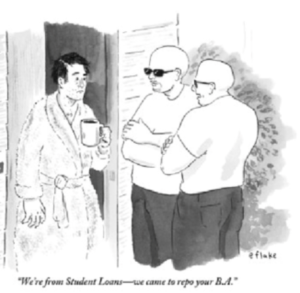
In reply Rosalie referred to the current Liberal Minister of Education who was responsible for huge hikes in the cost of tertiary education in Australia.
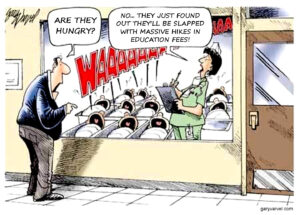
She asked: ‘What’s Pyne going to do with respect to my wonderful daughter’s university opportunity?
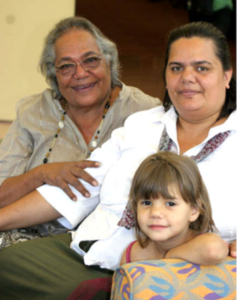
Put a debt around her neck and say ‘You will not survive. You are a woman. You don’t need education. Sit down in the camp! She’d like to enter the U.N. as a lawyer. Young people are very aware of the injustices that we’re doing to each other on the basis of’ colour, on the basis of culture. Wrong! These young people of tomorrow, because we don’t have a bill of rights in Australia, are going to make it happen. They will demonstrate and they will be heard. We will be dead and buried, the ones that hold the so-called power. It’s so blind. They don’t see the rising of the young people. They don’t see the black consciousness of your Australian people. Get it right.’
John Pilger believes to get it right a treaty between “those whose land was stolen . . . and those who stole it” is the solution to inequalities explored in Utopia.
“Such a treaty, negotiated between equals, would be a bill of rights to health, education, land and dignity – everything that most non-Indigenous Australians take for granted.”
‘If that does not happen, if we do not give back to the first people their nationhood, we can never claim our own.’
Tony asked, ‘Stuart Rees, what advice would you give to today’s young people?’
‘If you want to be in touch with your humanity, you have to be outraged by injustice because the alternative is indifference.
As for fossil fuels, we have to basically end all subsidies—all subsidies—for exploring new reserves. That has to stop. We have to basically tax carbon. We need to tax carbon and stop talking about climate mitigation of, you know, one pollution credit versus another, allowing someplace to pollute versus saving carbon elsewhere. We have to get beyond that and look at carbon tax. We have to look at cutting—not only cutting exploration, changing the laws that now allow fracking to proliferate throughout America, and looking at basically ending subsidies for fossil fuels.
‘And Jane, lastly to you. What advice do you have for today’s twenty year olds?’
‘To my twenty year old self I would simply repeat the advice my mother gave me when I was ten years old and dreaming of going to Africa and living with animals and writing about them. Everybody laughed at me. that wasn’t possible for a girl, we didn’t have any money, but she said, ‘If you really want something, you have to work hard. work hard and never give up. This is the advice I would give any 20 year old.’